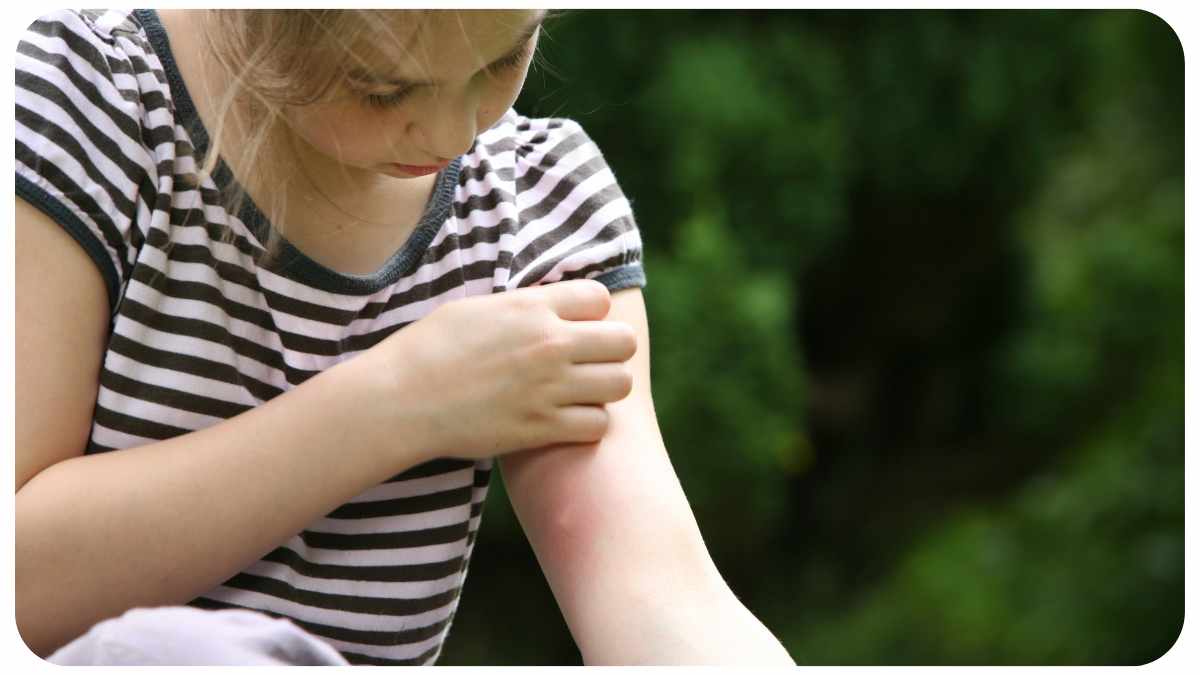Mosquito bites can be very annoying, especially if a lot of them are clustered together. Mosquitoes usually bite at night when people are asleep, so it might take some time before you realize what has happened.
Even if you get bitten just once and know that you have been infected by mosquitoes, it can still be difficult to get rid of those pesky bites quickly. Here are 11 ways to get rid of mosquito bites quickly and stop itching:
| Key Takeaways |
|---|
| Mosquito bites are caused by female mosquitoes piercing the skin to feed on blood. |
| Mosquito bites can cause redness, swelling, and itching. |
| Preventative measures like wearing protective clothing, using insect repellent, and removing standing water can reduce the risk of mosquito bites. |
| Home remedies such as applying a cold compress or taking an oatmeal bath can alleviate the symptoms of mosquito bites. |
| Mosquito bites can lead to illnesses like Zika virus, West Nile virus, and dengue fever, so it’s important to be aware of symptoms and seek medical attention if necessary. |
Use Toothpaste
If you’re looking for an easy way to get rid of mosquito bites, toothpaste is one of the best solutions. It’s fast, cheap, and effective—not to mention it can help alleviate any itching that comes with the bite.
Here’s how:
- Use a small amount of toothpaste on your fingers to rub over the affected area for about five minutes (you’ll see why in a few).
- After five minutes have passed, wash off all traces of toothpaste and then rinse your skin with warm water.
- If your skin is still irritated after doing this method once, you can repeat it up to three times per day until the swelling goes down.
Mosquitoes may be annoying, but fortunately, there are many effective methods to get rid of them. Our easy guide on how to get rid of mosquitoes can help you eliminate these pesky insects and avoid unwanted mosquito bites.
Sleeve Up
You can also cover your skin with clothing and repellant. Longer sleeves and pants will cover more of your body, making it harder for mosquitoes to bite you.
If you do get a mosquito bite on your arms or legs, wear long sleeves under short-sleeved shirts so that when the short-sleeved shirt comes off, you’ll still have some protection from mosquitoes—or carry insect repellent in case the pesky bugs find their way under the fabric.
Using insecticides like DEET is another option (in addition to covering yourself). This chemical is absorbed through mosquito bites when applied topically; it interferes with neural impulses inside their bodies, causing them discomfort and preventing them from biting again!
Apply Baking Soda
You can also apply baking soda to your bites to help reduce swelling and itching. Baking soda is a natural antiseptic, which means it helps kill bacteria that cause infections. It’s also a great way to clean the bite area because it will cleanse your skin and remove any dirt or debris from the wound that might be causing you discomfort.
Baking soda is best applied topically (directly on the skin). It should not be ingested in large quantities, so make sure you don’t get any near your mouth!
Prevention is key when it comes to avoiding mosquito bites. Learn about some of the most effective ways to keep mosquitoes at bay with our proven tips on how to keep mosquitoes away.
Avoid Itchiness
When it comes to mosquito bites, the best advice is to avoid scratching. The itchiness that accompanies most mosquito bites can be a serious problem for some people. And if you’re trying to avoid scratching the bite, then use these methods:
Cold compress: This can help reduce itchiness by cooling the skin and reducing swelling. Just run a cold washcloth under water, wring it out until it’s just damp (not soaking wet), and apply it gently over your bite area. You should be able to see an immediate reduction in swelling and redness after the application of this method!
Ice or ice pack: If you don’t have access to a cold compress, an ice pack wrapped in a towel may do the trick instead – but remember not to leave it on longer than 10 minutes at a time because that would cause frostbite instead!
Just make sure not too much pressure is applied while using one of these methods since they will numb skin over time; otherwise, follow directions carefully so as not dictate how long should last before discontinuing use.”
Use Tea Tree Oil
The fifth and final remedy is tea tree oil. Tea tree oil has antibacterial properties that can help prevent the bites from getting infected, and it will also keep the swelling down. To use this remedy:
- Take a cotton swab and dip it into some tea tree oil.
- Apply a small amount of the tea tree oil directly to your mosquito bite(s).
- Alternatively, you can take a bandage (such as a band-aid) and apply a small amount of tea tree oil to that instead of applying it directly to your mosquito bite(s).
Reach For Apple Cider Vinegar
Apple cider vinegar is an antiseptic and it can be used to kill bacteria, viruses, and fungus. It can be applied directly to the bite or added to a bath. Apple cider vinegar can also be used as a mouthwash if you have bad breath after having mosquito bites!
If you prefer not to apply apple cider vinegar on your bites, try taking a bath in it instead!
Mosquito bites can be itchy and uncomfortable, especially if they result in swelling. Fortunately, you can reduce the swelling and alleviate your discomfort with our simple and effective tips on how to reduce the swelling of a mosquito bite.
Apply Some Witch Hazel
Witch hazel is an astringent that can help stop the itching, reduce swelling, and reduce redness. It can also prevent infection and inflammation, making it a great remedy for mosquito bites.
Witch hazel may be able to reduce pain as well by drying out your skin so that you won’t feel as much discomfort when you move around or touch anything else on your body.
Use Aloe Vera
Aloe vera is a natural anti-inflammatory and can help reduce swelling. It also has soothing properties, so it can help with the itching and burning that come from mosquito bites. It’s also said to have healing properties, so if you have a particularly large welt or red spot on your skin, aloe vera may provide some relief.
If you’re not sure about using aloe vera, talk to your doctor first. He or she might be able to recommend an alternative treatment option in case you’re allergic or sensitive to the plant’s oils or chemicals.
Take An Antihistamine
You can take an over-the-counter antihistamine that will help with the itching and swelling. Some people prefer to take pills, but others may want to try a liquid because it’s easier for them to swallow.
Antihistamines may make you drowsy, so be careful if you need to go out later in the day.
There are numerous products on the market that claim to repel mosquitoes, but many contain harsh chemicals. Why not try making your own mosquito repellent using natural ingredients? Check out our easy tips on how to make mosquito repellent and enjoy a bug-free summer without any harmful chemicals
Apply A Cold Compress
Another way to reduce swelling and itching is by applying a cold compress. This works by reducing the blood flow to the affected area, which reduces swelling and inflammation.
If you would like to try this method, place a bag of frozen vegetables, ice cubes or a cold pack on the affected area for about 20 minutes. Make sure that you do not directly apply ice to your skin or it can cause frostbite.
Try Hot Water And Soap
If you have tried everything and are still struggling with the pain of a mosquito bite, consider using hot water and soap. By soaking the affected area for five minutes in hot water and soap, you can help kill off some of the bacteria that make mosquito bites so painful. You should repeat this process until your bite stops hurting.
Clean The Bite With Rubbing Alcohol Or Soap And Water
Cleaning the bite with rubbing alcohol is an effective way to dry out the area, but make sure you use a clean cloth and avoid getting any of it in your eyes. Soap and water will also do the trick, as long as you don’t rub too vigorously.
Do not use hydrogen peroxide since this may irritate inflamed skin or cause sensitivity to light (photophobia). After cleaning, apply an antibiotic cream twice daily until healed.
The best way to avoid mosquito bites is to not get bitten in the first place. Find out how you can protect yourself from mosquitoes and minimize your chances of being bitten with our guide on how to not get mosquito bites. From wearing the right clothes to using the right insect repellent, we’ve got you covered
Conclusion
When you get bitten by mosquitoes, the itching can be unbearable. If you know how to get rid of mosquito bites quickly, you can stop scratching and start enjoying your time outside again.
Further Reading
Here are some additional resources to learn more about preventing and treating mosquito bites:
CDC: Symptoms of Mosquito-Borne Illnesses – Learn about the symptoms of common mosquito-borne illnesses, such as Zika virus, West Nile virus, and dengue fever.
Prevention: How to Get Rid of Mosquito Bites – Discover natural remedies and over-the-counter treatments for mosquito bites, plus tips on preventing bites in the first place.
Healthline: 18 Home Remedies for Mosquito Bites – Find relief from mosquito bites with these easy and effective home remedies, such as applying a cold compress, using essential oils, and taking an oatmeal bath.
FAQs
What are mosquito bites?
Mosquito bites occur when female mosquitoes pierce the skin with their proboscis to feed on blood. Mosquito bites can cause redness, itching, and swelling.
Why do mosquitoes bite humans?
Female mosquitoes require blood to produce eggs, so they feed on the blood of humans and other animals. Male mosquitoes do not bite humans and feed only on plant nectar.
How can I prevent mosquito bites?
You can prevent mosquito bites by wearing long sleeves and pants, using insect repellent, and avoiding areas with standing water where mosquitoes breed.
What should I do if I have a mosquito bite?
If you have a mosquito bite, you can alleviate itching and swelling by applying a cold compress, taking an antihistamine, or using over-the-counter topical treatments.
Can mosquito bites lead to illness?
In some cases, mosquito bites can result in illnesses like Zika virus, West Nile virus, and dengue fever. Symptoms of mosquito-borne illnesses may include fever, rash, joint pain, and muscle aches.

Hello! I’m Hellen James, and I write about how to keep pests from invading your home. For the last 10 years, I’ve been working in pest control and am excited to share my expertise with you!


